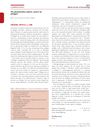 11 citations,
June 1996 in “Nutrition”
11 citations,
June 1996 in “Nutrition” Vitamin D3 may prevent hair loss from chemotherapy, but side effects and cancer cell protection are concerns.
 13 citations,
December 1940 in “The journal of nutrition/The Journal of nutrition”
13 citations,
December 1940 in “The journal of nutrition/The Journal of nutrition” Lack of certain vitamins causes fur loss and greying in silver foxes.
 June 2003 in “Obstetrical & Gynecological Survey”
June 2003 in “Obstetrical & Gynecological Survey” Postmenopausal ovary stromal cells have a unique makeup and limited steroid production, suggesting androgens come from the adrenal gland.
[object Object]  175 citations,
April 1982 in “Journal of The American Academy of Dermatology”
175 citations,
April 1982 in “Journal of The American Academy of Dermatology” Isotretinoin is highly effective in treating severe acne, rosacea, and gram-negative folliculitis.
 138 citations,
July 2015 in “Clinical, Cosmetic and Investigational Dermatology”
138 citations,
July 2015 in “Clinical, Cosmetic and Investigational Dermatology” Eating less sugar, milk, and saturated fats and more vegetables and fish may help treat and prevent acne.
 1 citations,
October 2022 in “International journal of endocrinology”
1 citations,
October 2022 in “International journal of endocrinology” Dihydrotestosterone changes some hormone-related gene expressions in rat pituitary glands but doesn't affect the estrous cycle.
 10 citations,
June 2014 in “Journal of Pharmacy and Pharmacology”
10 citations,
June 2014 in “Journal of Pharmacy and Pharmacology” Germacrone in Curcuma aeruginosa extract degrades at high temperatures but is stable in certain solutions and unaffected by pH levels.
 16 citations,
March 2007 in “The Veterinary clinics of North America. Food animal practice”
16 citations,
March 2007 in “The Veterinary clinics of North America. Food animal practice” Proper mineral supplementation in cow-calf operations prevents health issues and economic losses.
 March 2024 in “Research Square (Research Square)”
March 2024 in “Research Square (Research Square)” Sex steroids affect the MafB gene differently in male and female hamsters.
 16 citations,
September 1964 in “The journal of investigative dermatology/Journal of investigative dermatology”
16 citations,
September 1964 in “The journal of investigative dermatology/Journal of investigative dermatology” New compounds can block testosterone effects in rats and might help treat conditions like prostate cancer and acne.
 3 citations,
April 2021 in “Journal of Medicinal Chemistry”
3 citations,
April 2021 in “Journal of Medicinal Chemistry” Finasteride may affect PNMT, causing side effects.
 13 citations,
April 2019 in “Actas Dermo-Sifiliográficas”
13 citations,
April 2019 in “Actas Dermo-Sifiliográficas” Vitamin D is important for skin health, but more research is needed to understand its full effects and treatment potential.
23 citations,
October 2009 in “Gastroenterology” Vitamin D is crucial for bone health and preventing serious diseases.
 October 2023 in “Frontiers in endocrinology”
October 2023 in “Frontiers in endocrinology” Effective PCOS treatments require targeting specific signaling pathways.
 238 citations,
July 2003 in “British Journal of Plastic Surgery”
238 citations,
July 2003 in “British Journal of Plastic Surgery” Hidradenitis suppurativa, a chronic skin disease, can be managed with antibiotics, lifestyle changes, and in severe cases, surgery. Early diagnosis and careful planning are key, and laser treatment can be an efficient solution for mild to severe cases.
 8 citations,
May 1998 in “Journal of Oral and Maxillofacial Surgery”
8 citations,
May 1998 in “Journal of Oral and Maxillofacial Surgery” Acne is caused by increased sebum, abnormal skin shedding, bacteria, and inflammation, not dirt; treatments vary from creams to antibiotics or isotretinoin, with severe cases needing a dermatologist's care.
 172 citations,
December 2004 in “Journal of The American Academy of Dermatology”
172 citations,
December 2004 in “Journal of The American Academy of Dermatology” Demodicosis is common and often missed, needing more recognition and treatment in skin care.
 126 citations,
October 1983 in “Journal of The American Academy of Dermatology”
126 citations,
October 1983 in “Journal of The American Academy of Dermatology” Isotretinoin effectively treats severe acne and similar conditions, but has common, mostly reversible side effects, requiring careful patient monitoring.
 15 citations,
August 2016 in “Current Urology Reports”
15 citations,
August 2016 in “Current Urology Reports” Nandrolone and oxandrolone could help treat male health issues like muscle loss and low testosterone.
 61 citations,
May 2015 in “Planta”
61 citations,
May 2015 in “Planta” Certain fungi and bacteria help orchid seeds germinate and plants grow better.
 48 citations,
February 2008 in “Nutrition in Clinical Practice”
48 citations,
February 2008 in “Nutrition in Clinical Practice” Dietary changes, including weight loss and a balanced diet, are important for managing PCOS, especially in overweight women.
 39 citations,
January 2013 in “Indian Journal of Dermatology, Venereology and Leprology”
39 citations,
January 2013 in “Indian Journal of Dermatology, Venereology and Leprology” Eating high glycemic foods and drinking milk may worsen acne by increasing insulin and IGF-1 levels.
 August 2023 in “Malaysian Journal of Medicine and Health Sciences/Malaysian journal of medicine and health sciences”
August 2023 in “Malaysian Journal of Medicine and Health Sciences/Malaysian journal of medicine and health sciences” Pueraria mirifica extract may help treat benign prostatic hyperplasia.
 June 1930 in “Archives of dermatology”
June 1930 in “Archives of dermatology” Dermatological conditions are complex, and treatments have mixed results.
 October 2017 in “Springer eBooks”
October 2017 in “Springer eBooks” A thorough initial check-up is essential before sperm banking to ensure the best chance of preserving good quality sperm.

Diet and supplements can significantly affect acne, with some foods and nutrients reducing and others worsening it.
 2 citations,
May 2011 in “British Journal of Dermatology”
2 citations,
May 2011 in “British Journal of Dermatology” Pellagra, caused by niacin deficiency and presenting with photosensitivity, should be considered in patients with relevant symptoms and risk factors.
 August 2021 in “Acta Haematologica Polonica”
August 2021 in “Acta Haematologica Polonica” Folliculotropic mycosis fungoides has a worse prognosis than other types, with survival rates varying significantly based on subtype and organ involvement.
[object Object]  April 2015 in “Cambridge University Press eBooks”
April 2015 in “Cambridge University Press eBooks” Many women experience sexual dysfunction, but few seek help, and better treatment and medical training are needed.
 551 citations,
November 2013 in “Nature”
551 citations,
November 2013 in “Nature” Certain mature cells in mouse lungs can turn back into stem cells to aid in tissue repair.





























